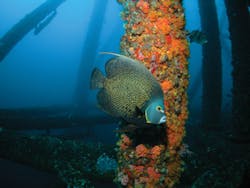'Rigs-to-Reefs' benefits oil industry, marine life
There comes a time when the useful life of an oil rig comes to an end—at least when it comes to drilling for oil. Over 20 years ago, regulators noticed that with the removal of decommissioned rigs came a significant loss in reef habitat. The idea of the "Rigs-to-Reefs" program was born.
Federal law and international treaty require retired platforms to be removed one year after production ceases, at great expense to the industry. The Louisiana Artificial Reef Program was established in 1986 and proved beneficial to both the oil and gas industry and the coastal fisheries. Companies donate pieces of the decommissioned rigs, in addition to a portion of the savings over a traditional onshore removal.
Since the program's inception, more than 60 offshore reef sites, utilizing 232 obsolete platforms have been created off Louisiana's coast. The Institute for Energy Research estimates more than 150 reefs have been created in the entire Gulf of Mexico. The use of obsolete oil and gas platforms in Louisiana has proved to be highly successful. The sheer number of rigs, along with their design, longevity, and stability, has provided a number of advantages over the use of traditional artificial reef materials.
Diving scientists at MMS have observed invertebrates and plants attach to petroleum platforms within weeks of their initial placement in the marine environment. Within a year, the platform can be completely covered with plants and sessile invertebrates, attracting mobile invertebrates and fish species, and forming a highly complex food chain. The openness of a platform structure allows for water circulation and easy mobility for fish inside the structure where it attracts not only bottom dwelling fish, but also mid- to top-water dwellers.
ATP and Shell were just two of the oil companies donating to the cause in the past months.
A decommissioned rig is a haven for many marine species, like this French Angel.Photo courtesy of John Embesi.
Houston-based ATP donated its first platform to the Rigs-to-Reefs program in September. The company's chairman and CEO, T. Paul Bulmahn, said, "The Rigs-to-Reef program benefits both the industry and the environment. The industry saves towing and demolition dollars, and a very real beneficiary is the marine life that utilizes the structures for their new homes."
The company donated its Vermilion 318 "A" platform jacket to the program for the creation of a new artificial reef in the Gulf of Mexico in South Marsh Island 133. Additionally, the company donated $415,200 into the Louisiana Artificial Reef Trust Fund to provide for research, development and management of artificial reefs.
In October, Shell donated $450,000 to the cause. Like the donation from ATP, funds will help support efforts to protect and foster fish and other marine life in Louisiana coastal waters and the Gulf of Mexico.
LDWF Secretary Robert Barham commented, "These funds will help create amazing fishing opportunities for charter boat captains, recreational and commercial fishermen and enhance the state's reputation as one of the best places to fish in the US."
MMS studies have found that fish densities are 20 to 50 times higher near offshore platforms than in nearby open water, an especially important fact since the Gulf of Mexico lacks any naturally occurring reefs.
Shell's donation complements the relocation of decommissioned Eugene Island 331A's platform steel jacket in September to create an artificial reef roughly 100 miles south of Iberia Parish, La. The structure, which suffered significant damage in Hurricane Ike in 2008, is now part of the Gulf of Mexico's Rigs to Reefs Program.
Richard Newsom, vice president for operations services and project support for Shell commented, "As one of the leading energy producers in the Gulf of Mexico, we operate in the Gulf everyday and have a strong appreciation for the importance of the marine life habitat and the Gulf's eco-system."
It is estimated that over 75 oil and gas related companies have participated in the program. Chevron, Apache, W&T Offshore, Noble Energy, El Paso, ExxonMobil, Texaco, BP, Conoco, Hunt, Anadarko, Forest Oil, Newfield, Energy XXI, McMoRan, Oxy, Marathon, and others have all donated various structures to the Louisiana Artificial Reef Program over the years.
More Oil & Gas Financial Journal Current Issue Articles
More Oil & Gas Financial Journal Archives Issue Articles
View Oil and Gas Articles on PennEnergy.com

